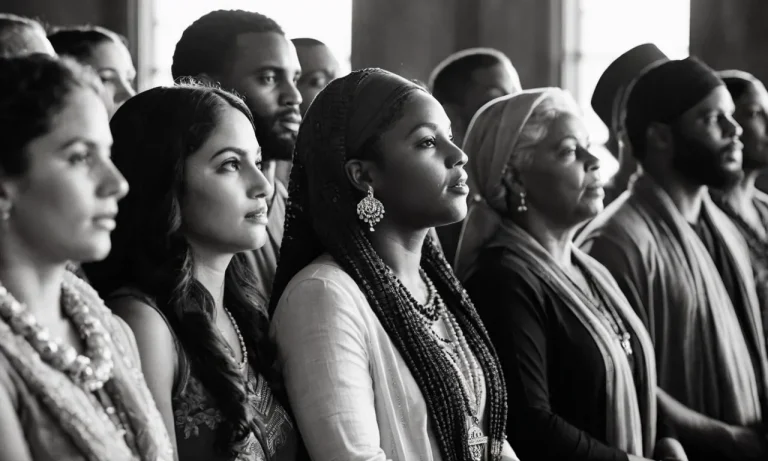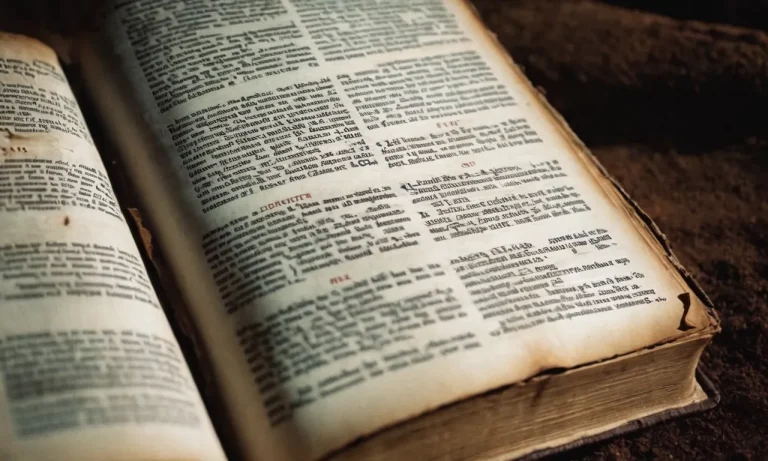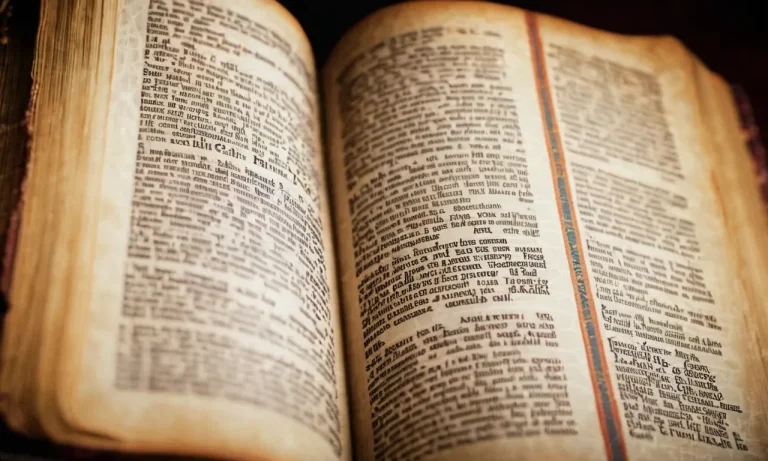What Does Liberty Mean In The Bible?
The concept of liberty is central to the Bible’s message of salvation and freedom through faith in Jesus Christ. This article will explore the biblical meaning of liberty, tracing its themes through Old and New Testament passages about deliverance from oppression and new life in the Spirit.
If you’re short on time, here’s a quick answer to your question: In the Bible, liberty refers to freedom from slavery, oppression, and sin through God’s power. Key ideas connected to biblical liberty include deliverance, redemption, salvation, and walking by the Spirit rather than the law.
We’ll examine liberty as it relates to Israel’s deliverance from Egypt in the Exodus, the Year of Jubilee’s release from debt, Jesus’ proclaiming good news to the captives, Paul’s contrast of life by the law versus the Spirit, and more.
Expect about 5 major section headings tracing this concept across key Bible texts.
Israel’s Liberty in the Exodus
The exodus of the Israelites from Egypt marked a pivotal moment in biblical history, as God delivered His people from slavery and oppression. After 400 years of bondage, the Lord fulfilled His promise to Abraham by leading Israel out of Egypt and towards the Promised Land of Canaan.
This incredible event is recounted in the book of Exodus and celebrated each year during the Passover festival.
For the Israelites, the exodus represented a newfound experience of liberty and freedom. Having suffered under cruel Egyptian taskmasters who afflicted them with forced labor, the people of Israel were now liberated to follow and worship their God.
No longer would they be subject to Pharaoh’s harsh decrees or live at the whim of Egypt’s totalitarian regime. Instead, they were free citizens under God’s law, guided by His presence and provision.
Freedom from Oppression
The exodus gave the Israelites freedom from oppression, as God delivered them from slavery. The Egyptians had forced them into hard labor, imposing production quotas and beating them when they did not comply (Exodus 5:6-18).
Even worse, Pharaoh ordered the slaughter of all newborn Hebrew boys (Exodus 1:15-16, 22). The people cried out to God, and He responded by unleashing the 10 plagues on Egypt, culminating in the death of the firstborn.
With Pharaoh’s permission, the Israelites were finally released from their cruel oppression.
Freedom of Worship
The exodus also gave Israel religious liberty to worship Yahweh as the one true God. In Egypt, they had adopted Egyptian idols and gods, angering the Lord (Joshua 24:14; Ezekiel 20:7-8). Now, liberated from those pagan beliefs, they were called to worship God alone.
The exodus was God’s act of redemption, securing Israel as His special possession (Exodus 6:6-7). No longer could they be prevented from offering sacrifices, observing holy days, and living by God’s commands.
Freedom Under God’s Law
At Mount Sinai, Israel’s newfound liberty was safeguarded through God’s Law. The Ten Commandments and other regulations provided moral guidelines for living as God’s covenant people. No longer did they need to follow the unrighteous decrees of Pharaoh.
Instead, they could order society by God’s righteous standards and precepts. The Law served as a constitution for Israel’s new nation, guiding civic and social responsibilities.
The Exodus demonstrated that true freedom is found in submitting to God’s authority. Israel’s liberty was not a license to sin or live however they wanted. It was the freedom to live as God intended – according to His Word and in relationship with Him.
Only through obedience to the Law could Israel fully experience the blessings of freedom.
The Year of Jubilee’s Liberty
The Year of Jubilee was a time of great celebration and liberation in ancient Israel. Every 50 years, slaves and prisoners were freed, debts were cancelled, and ancestral lands that had been sold were returned to their original owners (Leviticus 25:8-13).
This remarkable practice was rooted in God’s desire for justice, equity, and the periodic restoration of right relationships in society.
The Jubilee year provided a periodic “reset button” for the economy and social structure. It prevented large concentrations of wealth and land from accumulating in the hands of a few at the expense of the broader community.
It ensured that those who had fallen into poverty or slavery due to economic forces beyond their control were given a new start. Families that had lost their land could return home and begin again. The Jubilee was a reminder that the land belonged to God, not any human owner, and that the Israelites were stewards and tenants living on His land (Leviticus 25:23).
This remarkable practice reflected God’s heart for justice, compassion, and communal harmony. It prevented the endless concentration of wealth and power in the hands of a few. The Year of Jubilee reminds us that true liberty comes when individuals, families, and communities are set free from cycles of poverty, debt, and inequality.
While the Jubilee laws may seem radical and impractical today, they reflect principles of economic justice, communal solidarity, and restoration that are still very relevant.
Though modern economies no longer practice Jubilee years, the biblical principles behind this institution continue to inspire movements for social justice and financial reform. The Jubilee concept of “emancipation” and “return” echoes in the liberation theology movement of modern times.
The biblical vision of economic justice and periodic social “resets” motivates those working to reduce inequality and poverty in the 21st century. Though the mechanisms may look different today, the spirit of Jubilee continues to resonate with all who seek increased liberty and justice.
Jesus’ Ministry of Deliverance
Jesus’ earthly ministry was characterized by acts of deliverance. He healed the sick, cast out demons, forgave sins, and proclaimed good news to the poor. Jesus came to set humanity free from bondage and oppression.
Healing the Sick
Throughout the Gospels, we see Jesus healing all kinds of illnesses and disabilities. He restored sight to the blind, made the lame walk, cured leprosy, and even brought people back from the dead. These miracles demonstrated Jesus’ compassion and His authority over infirmity and disease.
By healing people’s physical ailments, Jesus gave them new hope and new life.
Casting Out Demons
Jesus frequently confronted and cast out demons who had taken control of people’s minds and bodies. He rebuked these evil spirits and commanded them to leave, setting their victims free. Jesus demonstrated His power over the spiritual forces of darkness and fulfilled Isaiah’s prophecy that the Messiah would “proclaim freedom for the captives” (Isaiah 61:1).
Forgiving Sins
In multiple instances, Jesus forgave people’s sins, relieving them of guilt and granting spiritual liberation. When Jesus told a paralyzed man that his sins were forgiven, religious leaders accused Him of blasphemy.
But Jesus proved His authority to forgive sins by healing the man’s paralysis as well (Luke 5:17-26). Forgiveness of sins was a central aspect of the deliverance Jesus provided.
Good News for the Poor
When Jesus read from the Isaiah scroll in the synagogue, He emphasized the line, “to proclaim good news to the poor” (Luke 4:18). Throughout His ministry, Jesus reached out to the poor, oppressed, and marginalized of society. He treated them with love and dignity, affirming their worth.
Jesus’ message of the kingdom offered new hope and freedom to those who had none.
In all these ways, Jesus fulfilled His mission “to proclaim freedom for the prisoners and recovery of sight for the blind, to set the oppressed free” (Luke 4:18). He delivered people from sickness, sin, evil spirits, poverty, and despair.
Jesus ushered in the kingdom of God by setting people free through His gracious words and miraculous deeds.
Freedom in the Spirit, Not Law
The concept of liberty is central to the teachings of the Bible. When Scripture talks about freedom, it is not referring to political liberty or freedom from external rule. Rather, biblical freedom has to do with an internal spiritual reality – freedom from sin and freedom to serve God.
Freedom from Sin’s Power
One key aspect of biblical freedom is freedom from the power and penalty of sin. Even though Christians still struggle with sin, they are liberated from sin’s absolute dominion over them (Romans 6:14).
Through Christ’s sacrificial death on the cross, believers are set free from sin’s control and no longer have to be enslaved to their sinful desires (Romans 6:6-7).
This freedom from sin allows Christians to live in obedience to God rather than being compelled to keep sinning. As Romans 6:18 (ESV) states, “Having been set free from sin, you have become slaves of righteousness.”
So spiritual freedom means freedom to do what is right in God’s eyes rather than being shackled by sin.
Freedom from the Law’s Burden
Freedom in Christ also includes freedom from the burden of trying to earn salvation through keeping the Old Testament law. The law served the purpose of revealing God’s perfect standards. However, Scripture teaches that no one can be justified by the works of the law (Galatians 2:16).
Thankfully, Christ has set believers free from the law’s requirements as a means of salvation (Romans 8:2).
This does not mean Christians can live lawless lives. But it does mean they relate to biblical commandments differently – as those already declared righteous in Christ, not those still striving to merit righteousness through works.
Believers seek to obey biblical commands out of love and gratitude, not legalistic compulsion or in order to earn favor with God.
Freedom to Serve God Wholeheartedly
Most importantly, freedom in the Bible is freedom for something – freedom for unhindered relationship with and service to God. Having been freed from both the penalty and power of sin, Christians can now obey God out of willing hearts, serve Him without restraint, and fulfill the purpose for which they were created.
As Galatians 5:13 (NIV) says, “You, my brothers and sisters, were called to be free. But do not use your freedom to indulge the flesh; rather, serve one another humbly in love.” This is the essence of biblical freedom – having the liberty as God’s dearly loved children to obey and serve Christ out of genuine love.
Implications for Christian Liberty
Christian liberty, as discussed in the Bible, has profound implications for how Christians should live their lives. At its core, Christian liberty means freedom from sin and the requirements of the Old Testament law through faith in Jesus Christ (Galatians 5:1).
However, this freedom is not a license to sin, but rather an opportunity to serve God and others out of love (Galatians 5:13). What are some of the key implications of Christian liberty?
Freedom of Conscience
Christian liberty provides freedom of conscience – believers have the right to be fully convinced in their own minds on disputable matters (Romans 14:5). This means that Christians can hold different views on issues not directly addressed in Scripture, like eating, drinking, and sacred days (Romans 14:2-6).
As long as activities are not expressly forbidden, believers have liberty to follow their conscience. However, Christians are not to judge one another on these matters but accept one another (Romans 14:13).
Not Everything Beneficial
Just because believers have the freedom to do something does not mean it is beneficial or constructive (1 Corinthians 6:12). Christians are to consider how their actions affect others, not merely pursuing their own good.
Believers must discern if an activity will master them, bring them under its power or serve as a stumbling block to others (1 Corinthians 6:12). Christian liberty requires voluntarily limiting freedom for the sake of others.
Limits of Liberty
While Christian liberty provides significant freedom, it is not without limits. Christians are not free to sin or disregard clear Scriptural commands in the name of liberty. Liberty cannot be used as an excuse for immorality and licentiousness (Galatians 5:13, 1 Peter 2:16).
Believers must guard against abusing their freedom, ensuring what they do lines up with God’s word and serves others.
Conclusion
In examining key biblical passages, we have seen that the concept of liberty in the Bible centers on freedom from slavery, debt, oppression, and sin through God’s saving action. Whether in the Exodus, Jubilee, Jesus’ proclaiming good news to the captives, or Paul’s contrast of living by law versus the Spirit, Scripture points to the new life and freedom found in Christ.
This biblical theme of liberty remains relevant today. As Christians, we can walk in the freedom and deliverance from sin Christ won for us on the cross. We can also join God’s mission to proclaim this good news of liberty to the captives in our world today.








